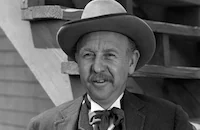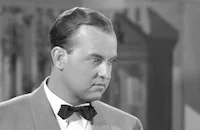Four Jacks and a Jill

Brief Synopsis
Cast & Crew
Jack Hively
Ray Bolger
Anne Shirley
June Havoc
Desi Arnaz
Jack Durant
Film Details
Technical Specs

Synopsis
Band leader Nifty Sullivan meets Karinina "Nina" Novak when he pulls her from the path of an onrushing car. Nina is ungrateful, however, and accuses him of causing her to lose her ticket to a concert that night. Chagrined, Nifty trades in his own concert ticket for two balcony seats, and they attend the performance together. Later, Nifty returns to Mike's Cellar, where he and his band, "Four Jacks and a Queen," perform. There, band members Happy McScud, Nat and Eddie inform Nifty that their singer, Opal, is thinking of deserting the group for The Noodle, her gangster boyfriend, and convince him to try to change her mind by romancing her. Nifty makes a date to meet Opal that night, but when a suspicious Noodle comes looking for his girl, he is about to throttle Nifty when Nina appears and claims that she, not Opal, is his date. In gratitude, Nifty invites the hungry Nina back to his apartment for a meal. There, she meets the rest of the band and tells them that she comes from the Balkan state of Aregal, where she enthralled King Stephan with her singing. Recognizing that her story is a fabrication, Nifty invites Nina, who is destitute, to spend the night at their apartment. The next morning, Nina tells the boys that the owner of Mike's Cellar has fired them because Opal has announced her retirement. Spinning her story of King Stephan to Mr. Hoople, the owner of the Little Aregal Café, Nina secures an engagement for the band, which is renamed "Four Jacks and a Jill." As Hoople awaits the appearance of the king, Steve Sarto, a taxi driver who has been dating Opal, takes refuge at the club to escape the jealous Noodle. Steve, an exact double for the king, is mistaken for his highness and decides to continue the charade. When Nifty, who has fallen in love with Nina, becomes jealous of Steve's attentions to her and quits the band, Hoople cancels their contract. Unemployed and hungry, Nifty is reduced to pantomiming prizefights to feed himself. Trying to reconcile the pair, Steve drives Nifty to meet Nina at the band's apartment, and during the ride there, he sees Steve's taxi license. At the apartment, Nifty exposes Steve as a lowly cab driver and announces that he is planning to take a job in Chicago. Promising Nina that he will prevent Nifty from leaving, Steve has him arrested for stealing his cab, and when the other band members try to prevent the arrest, they are jailed, too. Steve then convinces Hoople to rehire the band to stage "King's Night," promoting the appearance of King Stephan. Noodle deems "King's Night" the perfect opportunity to trap his rival Stephan and bails the band out of jail, and Nifty and Nina make up. The night of the performance, Steve arrives wearing the king's uniform. When the real king, who has been vacationing in South America, appears at the club, Steve flees with Opal, leaving a confused Noodle in his wake.

Director
Jack Hively
Cast

Ray Bolger

Anne Shirley

June Havoc

Desi Arnaz
Jack Durant
Eddie Foy Jr.

Fritz Feld

Henry Daniell
Jack Briggs
William Blees
Robert Smith

Fortunio Bonanova

Charles Arnt
Ted O'shea

Grady Sutton
Norman Mayes
Mary Gordon
Amarilla Morris
Leo White
Rosemary Coleman
Frank Martinelli
Armand "curley" Wright
Florence Lake

Mantan Moreland
Eddie Dunn
Frank Mills
Rafael Storm
Eddie Hart
Bob Perry
Constantine Romanoff
Max Lucke
Nina Wayler
Roy Crane
Jack Carr
Jack Gardner
Joe Bernard
Patti Lacey
Jane Woodworth
Crew
C. Bakaleinikoff
Monte Brice
Aida Broadbent
Albert D'agostino
Mort Greene
George Hively
J. R. Mcdonough
Russell Metty
Renie
Harry Revel
Gene Rose
Dewey Starkey
John E. Tribby
John Twist
John Twist
Vernon L. Walker

Videos
Movie Clip


Film Details
Technical Specs

Articles
Four Jacks and a Jill
By Violet LeVoit

Four Jacks and a Jill
Quotes
Trivia
Notes
The working titles of this picture were Four Jacks and a Queen and Street Girl. This picture marked actress June Havoc's screen debut and the promotion of writer John Twist to writer-associate producer. News items in Hollywood Reporter note that director Jack Hively and star Anne Shirley were orginally slated to work on Call Out the Marines, but were assigned to this picture when that production was delayed. According to other news items in Hollywood Reporter, Fritz Feld replaced Lou Holtz in the role of "Mr. Hoople," and Jack Durant replaced Sam Levene as "Noodle" because Levene had a prior commitment to another film. Pre-production news item in Hollywood Reporter add James Burke and Matt McHugh to the cast, but their appearance in the completed film has not been confirmed. A news item in Hollywood Reporter notes that the film was to include a musical number by Kay Kyser, but Kyser does not appear in the final film. According to modern sources, actor Ray Bolger later sued the studio for incorporating the prizefight routine that he performs in this picture into the 1949 film Make Mine Laughs. Bolger's suit forced RKO to withdraw that picture from distribution in 1951. Street Girl, RKO's first version of W. Casey Wonderly's story, was directed by Wesley Ruggles in 1929 and starred Betty Compson and Jack Oakie (see AFI Catalog of Feature Films, 1921-30; F2.5436). In 1937, the studio remade Wonderly's story as That Girl from Paris, directed by Leigh Jason and starring Lily Pons and Jack Oakie (see AFI Catalog of Feature Films, 1931-40; F3.4538).














